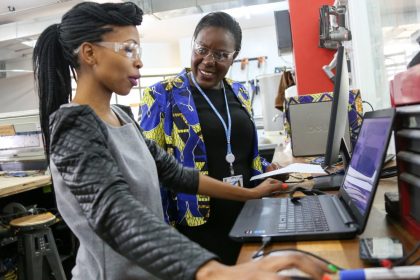In 2023, Samuel Okoli, a secondary school student preparing for his senior school certificate exams, attended virtual extramural classes during a third-term holiday.
He did not meet his teachers physically until he concluded his classes. Questions were asked virtually and answers provided via the same channel. He used virtual textbooks and submitted his assignments electronically.
“It was an exciting experience for my child,” said Dorothy Okoli, Samuel’s mother.
“It was smart, less stressful and eliminated face-to-face contacts which often breed unhealthy relationships that create problems for both children and parents,” she said.
In 2024, Samuel sat for the West African Senior School Certificate Examinations (WASSCE) and came out with distinctions (AI) in four subjects, with a ‘B’ grade in three.
Similarly, Aloysius Nkume, a parent, shared his son’s experience using a smart device.
“My son had a delayed speech problem, and because teachers are not always able to individualise instructions in the classroom, we got him a smart device loaded with educational programmes. This allowed him to learn at his own pace, and the impact was immeasurable,” he said.
Read also: Revamping Nigeria education system: A case for favourable import duties on toys & learning aids
The tech revolution
Nigeria’s education space is witnessing a transformation as dusty blackboards and cramped classrooms are being replaced by digital whiteboards and virtual textbooks. Teaching is moving from blackboards to smartboards, and students are getting used to e-books.
Hassan Bala, managing director at Learn Africa, said the dynamism of technology in Nigeria’s education space is improving reading and learning at a cost-effective rate.
“What changed in the education space is the reading mode and not reading itself. Reading has shifted from physical to e-books.
“Technology is cost-effective, as the cost of papers has gone up by over 300 percent. Book prices have skyrocketed, limiting parents’ purchasing power,” he said.
Benefits of tech to education
The incorporation of technology in education has changed teaching and learning, making education more accessible, efficient, and personalised.
Experts argue that digitisation offers students immeasurable benefits, such as increased reading tendency and better output.
Nubi Achebo, director of academic planning at the Nigerian University of Technology & Management, said that the digitised mode of learning has been a game-changer for education.
“With technology advancing rapidly, education has become more accessible, flexible, and inclusive.
“Students and teachers no longer need to be physically present to learn, thanks to online classes and digital resources. This has broken down geographic barriers, enabling students to access quality education,” he said.
Chris Nmeribe, a teacher, said it is wrong to believe children are not reading, simply because they are not carrying books.
“Children are still reading, but the obvious fact is that the format and mode have changed. Many students would rather learn via video and diagrams rather than just text.
“Many students are intentionally reading, but it’s no longer the old way of textbooks. They are reading through their smartphones,” he said.
Internet penetration
The number of smartphone users in Nigeria, Africa’s most populous nation, is forecast to grow to more than 140 million by 2025.
According to Statista, “Smartphone penetration is set to grow to around 60 percent by 2025 in Nigeria.”
Nigeria had 103 million internet users at the start of 2024 when internet penetration stood at 45.5 percent, according to DataPortal.
Nigeria was home to 36.75 million social media users in January 2024, representing 16.2 percent of the total population. About 205.4 million cellular mobile connections were active in Nigeria as at early 2024, equivalent to 90.7 percent of the total population.
Digital computers made their first appearance in Nigeria in 1963, while ICT introduction in schools was launched in 2004 and revised in 2010 to provide opportunities for secondary school students to build their capacities on digital skills and make them computer literates.
Smartphone adoption in Nigeria is predicated upon the advent of mobile telecommunication in 2011, as this development allowed for the exposure to mobile phones and internet penetration.
Read also: The Christie Toby teaching model: Panel traces Nigeria’s leadership crisis to collapse of effective classroom teaching
Tech helps special needs students
Victor Brown, a special educational needs and speech therapist, said digital platforms have made instructional resources more accessible and provided students the opportunity to learn more.
“Students can now access interactive learning tools, textbooks, and other resources, learn at their speed and get immediate feedback,” he said.
Besides, Brown said adaptive technology enables students with special needs to interact more effectively with the curriculum.
“Digital learning offers students flexibility because it’s unbounded without time constraints.
“It offers an alternative in a place where transportation issues and other infrastructure constraints limit access to traditional schools,” he noted.
Teachers require training in tech
Brown however said that digital resources may differ in accuracy and conformity to Nigeria’s educational curriculum, in contrast to regulated physical textbooks.
“Hence, the transition to digitalisation necessitates teachers’ training, as many teachers in Nigeria lack the digital expertise to hasten the shift,” he noted.
A case on hand was when Enugu State conducted a recruitment test for its school teachers. It was observed that the majority of teachers failed the computer-based test.
Friday Erhabor, director of media and strategies at Marklenez Limited, said: “Unlike those days when access to books and information is limited by the amount of money you have, technology has bridged the information gap between students in developed countries and undeveloped countries.
“Students now have global access with good smartphones and internet access. Medical students can now watch live surgery going on from the comfort of their room or classrooms.”
Challenges
Achebo, earlier quoted, said that despite the benefits of smart devices, Nigeria faces challenges in implementing digitised learning, with inadequate infrastructure, limited digital literacy, and internet connectivity still daunting issues.
“To overcome these challenges, the government and educational institutions must invest in digital infrastructure, teacher training, and online resource development,” he noted.
Also, Brown, earlier quoted, added, “Although online learning is more flexible, it can be difficult for students to maintain their attention in the absence of the classroom’s established structure and social interactions.”






